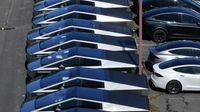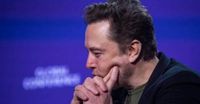Tesla is facing significant challenges as it prepares to report its earnings on April 22, 2025, with many investors and analysts expressing deep concerns about the company's future. The electric vehicle (EV) manufacturer has seen its stock plummet 36% year-to-date amid a backdrop of disappointing delivery numbers and a tarnished brand image largely attributed to CEO Elon Musk's involvement in the Trump administration.
As the company gears up for its earnings report, the stakes are high. Musk's close relationship with President Donald Trump, often referred to as the "First Buddy" due to their frequent interactions, has put Tesla in a precarious position. Investors are worried that if Musk maintains his ties with Trump, it could alienate potential customers who oppose the president's policies. Conversely, if he distances himself from Trump, he risks inciting the White House's ire.
In the first quarter of 2025, Tesla experienced its largest drop in sales after a period of steady double-digit growth. This downturn has left analysts and investors questioning the impact of Trump's 25% tariffs on imported vehicles, which Tesla is not immune to, despite the company not importing cars from its two overseas factories. Musk himself acknowledged the tariffs' impact, stating, "Important to note that Tesla is NOT unscathed here. The tariff impact on Tesla is still significant," on his social media platform, X.
Analysts are particularly concerned about Musk's role in the Department of Government Efficiency (DOGE), a position that many believe is diverting his attention from Tesla's pressing needs. Daniel Ives, an analyst at Wedbush Securities and a longtime Tesla bull, has been vocal about the situation, calling it a "code red" for the company. In a note to clients, Ives argued that Musk must step back from his government role and refocus on Tesla full-time, stating, "Musk needs to leave the government, take a major step back on DOGE, and get back to being CEO of Tesla full-time."
The pressure is mounting as Tesla faces increasing competition from other EV manufacturers, particularly in China, where the company has halted new orders for its higher-priced Model S and Model X due to retaliatory tariffs. In 2024, Tesla recorded $20.9 billion in sales in China, accounting for approximately 21% of its revenue. Ives referred to China as "the linchpin to the future success of Tesla," warning that the backlash from Trump's tariff policies could significantly harm the company's standing in the world's largest auto and EV market.
Protests outside Tesla showrooms and vandalism at its facilities further illustrate the backlash the company faces. Investors are eager to know how Tesla plans to address the negative sentiment surrounding Musk's political affiliations. Questions from investors have focused on the impact of Musk's government involvement on order inflow rates and whether the Tesla board is discussing the necessity for Musk to concentrate solely on the company.
"Did Tesla experience any meaningful changes in order inflow rate in Q1 relating to all of the rumors of 'brand damage'?" one investor asked, while another queried about the company's strategies to mitigate the fallout from Musk's partnership with the current administration.
The situation escalated when Tesla reported its most significant year-over-year drop in quarterly sales on April 2, 2025. Following this announcement, shares fell sharply, although they briefly rallied after Politico reported that Musk might soon relinquish his government role. However, that report was later deemed inaccurate.
Despite the challenges, Musk has made ambitious promises regarding Tesla's future, including plans for a fleet of self-driving robotaxis and humanoid robots. However, there have been no recent updates on these initiatives, and competitors like Uber and Waymo have already launched their own driverless taxi services in Austin, Texas, where Musk had initially planned to debut his service.
As the earnings report approaches, investors are keenly watching for any signs of progress on self-driving cars, plans for a less expensive Tesla model, and updates on the long-awaited Robotaxi fleet. The upcoming earnings call will be crucial for restoring investor confidence, especially after a series of setbacks that have left many questioning the company's trajectory.
While some analysts remain hopeful about Tesla's potential, the overall sentiment on Wall Street has soured. Ives, who previously maintained a bullish outlook, recently slashed his price target for Tesla shares, reflecting the growing concerns surrounding Musk's leadership and the company's brand damage. He emphasized that Musk's continued association with the Trump administration could lead to long-term repercussions for Tesla's reputation.
"If Musk chooses to stay with the Trump White House, it could change the future of Tesla, and brand damage will grow," Ives warned. Meanwhile, Tesla shareholder Ross Gerber has gone so far as to call for Musk's resignation, arguing that the company's leadership must change dramatically to heal the damage done.
As the April 22 earnings report looms, all eyes will be on Musk and whether he will make the necessary adjustments to refocus on Tesla's core mission. The outcome of this earnings call could determine not only the company's immediate financial standing but also its long-term viability in an increasingly competitive market.
In summary, Tesla's future hinges on Musk's ability to navigate the complex dynamics of his political affiliations while addressing the pressing challenges facing the company. Investors are hoping for a decisive shift that will allow Tesla to regain its footing and restore its reputation in the rapidly evolving automotive landscape.






